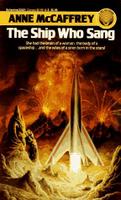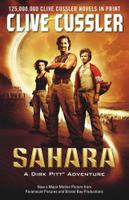This is the first book in one of the prolific Anne McCaffrey's many series. I have never (yet) read the other Brainship books, but it is a compelling idea-- to put humans born with damaged physical bodies and capable brains into powerful, new bodies shaped like cities and ships. McCaffrey plays out many of the problems that might accompany such a society-- how to treat brainships ethically and humanly, how they might interact with normal-bodied humans, and what some of their specific weaknesses might be despite their immense capabilities. But the reason this book really works is because Helva herself, the singing ship of the title, is so compelling. Far from feeling sorry for her, you may come to envy her cleverness and her strength-- both physical and mental, along with her ability to speed through space.
This book introduces us to the world of the brainships through the character of Helva, and after her intitial training, the plot follows Helva on a series of missions-- and of course, she runs into (and handles successfully, sometimes in spite of her human partner) some of the most dangerous missions and becomes the youngest ship ever to buy back her freedom (by paying for her education and the care that turned her into a brainship).
This book was published a while back, so it is a bit funny to see the technologies portrayed-- they have technology to connect a human brain to a "shell" so a person like Helva can control a powerful space ship, but their communications are somewhat behind-- they can use a "tight beam" like a radio to communicate, but Helva's human partners often bring her tapes or reels to convey the necessary information for their mission.
By making Helva a musician, McCaffrey makes it possible to explore how the world of art might interact with a technological world like the one she has created here. One more than one occasion, Helva uses her musical ability to help or manipulate humans in significant ways. One of Helva's stranger missions involves a delegation of actors and actresses who are sent to an alien society to perform teach Shakespeare's Romeo and Juliet for these aliens, and then teach it to them, in exchange for certain technologies and knowledge. The aliens conceive of drama in terms of energy exchange, and by the end of this mission, those ideas and terminology for drama make a great deal of sense.
| Title: | The Ship who Sang |
|---|---|
| Author: | Anne McCaffrey |
| Date published: | 1969 |
| Genre: | Science Fiction |
| Series: | Brainship series |
| Number of pages: | 248 |
| Notes: | Second reading. |



